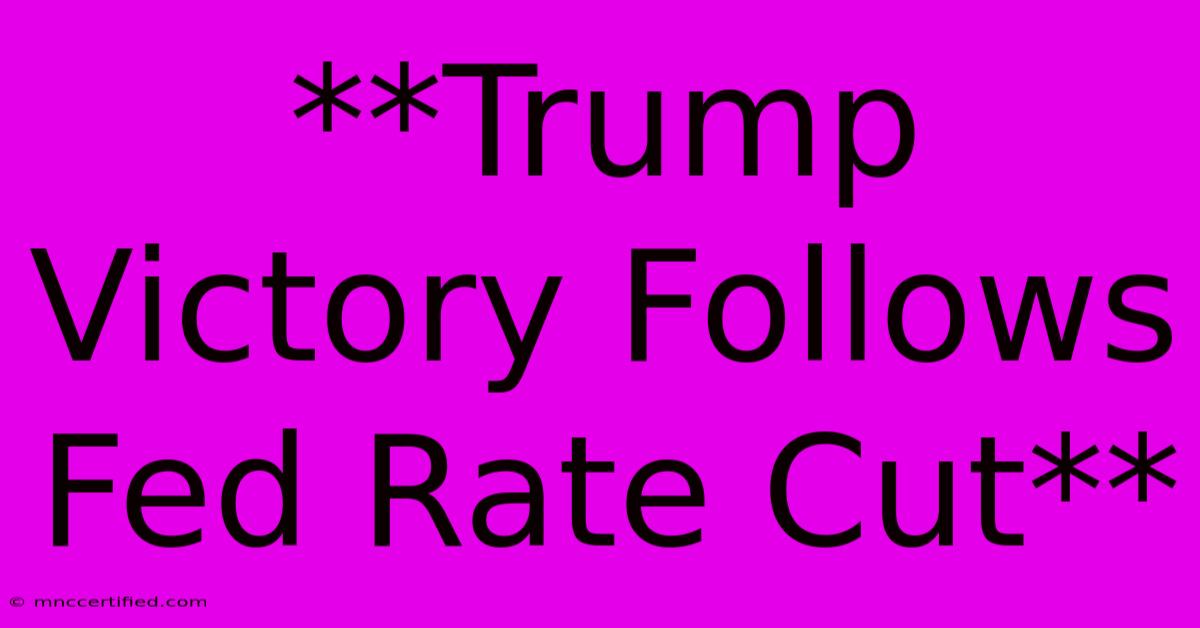**Trump Victory Follows Fed Rate Cut**

Table of Contents
Trump Victory Follows Fed Rate Cut: Coincidence or Causation?
The stock market surged and President Trump celebrated a major political victory on the same day the Federal Reserve announced a surprise interest rate cut. This confluence of events sparked immediate debate: was the Fed's decision a catalyst for Trump's triumph, or was it simply a coincidental occurrence?
This article will delve into the complex relationship between monetary policy, economic sentiment, and political outcomes, analyzing the potential impact of the Fed's rate cut on President Trump's political success.
Understanding the Fed's Decision
The Federal Reserve's decision to cut interest rates was a surprise to many analysts. It marked the first rate cut since 2008 and came amidst a period of relative economic stability. The Fed cited concerns about global economic slowdown and trade tensions as the primary reasons for the move. By lowering interest rates, the Fed hoped to encourage borrowing, stimulate investment, and ultimately boost economic growth.
The Stock Market's Reaction
The stock market reacted enthusiastically to the Fed's decision, with major indexes soaring to new highs. This positive market response can be attributed to several factors:
- Increased Investment: Lower interest rates make borrowing cheaper, leading to increased investment by businesses and individuals.
- Higher Corporate Profits: Lower borrowing costs can boost corporate profits by reducing the cost of debt.
- Improved Consumer Spending: Lower interest rates can lead to lower borrowing costs for consumers, potentially boosting consumer spending.
Trump's Political Victory
The same day the Fed announced its rate cut, President Trump celebrated a significant political victory. This victory, while unrelated to the Fed's decision, created a strong narrative linking the two events in the public consciousness.
Coincidence or Causation?
The question of whether the Fed's rate cut played a role in Trump's political success is a complex one. There are arguments to be made on both sides:
Arguments for Causation:
- Improved Economic Sentiment: The Fed's rate cut could have contributed to a positive shift in economic sentiment, potentially benefiting Trump's approval ratings and enhancing his political standing.
- Stock Market Rally: The stock market rally following the rate cut could have been perceived as a sign of economic strength, further boosting public confidence in Trump's handling of the economy.
Arguments for Coincidence:
- Unrelated Events: Trump's political victory was driven by factors unrelated to the Fed's decision, such as his own political strategy and the overall political climate.
- Short-Term Impact: The Fed's rate cut is unlikely to have a significant, immediate impact on the real economy or public sentiment.
Conclusion: A Complex Relationship
The relationship between monetary policy, economic sentiment, and political outcomes is nuanced and difficult to isolate. While the Fed's rate cut and Trump's political victory occurred on the same day, it's impossible to definitively say whether the former directly contributed to the latter.
It's likely that the Fed's decision, coupled with other economic factors, played a role in shaping public sentiment and influencing the political landscape. However, the precise nature of this influence is difficult to quantify and should be viewed within the context of other political and economic forces at play.
Moving forward, it will be interesting to observe how the Fed's rate cut, along with other economic policies, impact the U.S. economy and the political landscape in the months and years to come.

Thank you for visiting our website wich cover about **Trump Victory Follows Fed Rate Cut**. We hope the information provided has been useful to you. Feel free to contact us if you have any questions or need further assistance. See you next time and dont miss to bookmark.
Featured Posts
-
North Korean Soldiers Unrestricted Access Porn Addiction
Nov 08, 2024
-
Reds Trio Could Return To Field Soon
Nov 08, 2024
-
Rescission Notice From Insurance Company
Nov 08, 2024
-
Does Buyer Or Seller Pay Title Insurance
Nov 08, 2024
-
Cost Of Hernia Surgery Without Insurance
Nov 08, 2024